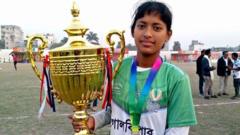In northern Bangladesh, girls' dreams of playing football have been dashed as Islamist protests forced the cancellation of several matches, raising concerns about women’s rights and empowerment in the Muslim-majority country.
Bangladesh Girls' Football Matches Canceled Amid Islamist Protests

Bangladesh Girls' Football Matches Canceled Amid Islamist Protests
Increasing Islamist pressure leads to the cancellation of women’s football tournaments, sparking fears for female empowerment in Bangladesh.
Earlier this month, Asha Roy, a 17-year-old aspiring footballer, was all set to compete in a women's tournament when the Islami Andolan Bangladesh group staged a rally against it, deeming the event un-Islamic. Local authorities promptly intervened, prioritizing the safety of the players over the event itself.
"I felt a mix of frustration and fear. We had never encountered such an obstacle before," Roy expressed her disappointment, reflecting the feelings of many girls who view sports as a path to empowerment and societal change. As Bangladesh navigates a complex political landscape post-protests against its authoritarian government, Islamist groups, previously marginalized, seem to be regaining influence with these actions.
The cancellation of the recent matches marks the third such case within two weeks in the region, underscoring a rising trend of aggressive pushback against women’s activities. In Dinajpur, a clash erupted between Islamist protesters and supporters of the football match, resulting in injuries. The developments have drawn sharp criticism online and have highlighted larger issues concerning women’s empowerment in Bangladesh, where football offers girls an avenue for hope and a brighter future.
The Islami Andolan Bangladesh insists that traditional values must be adhered to, claiming that women should only play in front of female audiences and should dress modestly. Their leader, Maulana Ashraf Ali, unequivocally stated their intention to implement hardline Islamic principles in the country.
Despite the growing intimidation, voices of resilience are emerging. Musammat Tara Moni, a 16-year-old teammate of Roy, remains determined to pursue her dreams of representing Bangladesh on an international football stage. "With my family's support, I won't give up hope," she affirmed.
Responses from the interim government have been mixed; while it has censured recent incidents and emphasized past successes in hosting women's sports, academics and activists warn of the growing threat posed by radical elements. Samina Luthfa from the University of Dhaka described the cancellations as "alarming," asserting that Bangladeshi women would continue to resist any efforts to erase them from public spaces.
Recent actions taken by interim authorities, including the lifting of a ban on the Islamist political party Jamaat-e-Islami, add to the growing apprehensions about an increasingly conservative societal atmosphere. Additional reports of violence against minority groups, particularly Sufis, and incidents of cultural censorship reflect broader societal tensions that could further risk marginalizing women's rights.
In conclusion, while the fight for female empowerment in Bangladesh faces renewed challenges from radical elements, the determination of young female athletes and their supporters offers a glimmer of hope in the face of adversity. As the nation grapples with its identity amidst political upheaval and rising extremism, the resilience of women could emerge as a pivotal force in shaping its future.
"I felt a mix of frustration and fear. We had never encountered such an obstacle before," Roy expressed her disappointment, reflecting the feelings of many girls who view sports as a path to empowerment and societal change. As Bangladesh navigates a complex political landscape post-protests against its authoritarian government, Islamist groups, previously marginalized, seem to be regaining influence with these actions.
The cancellation of the recent matches marks the third such case within two weeks in the region, underscoring a rising trend of aggressive pushback against women’s activities. In Dinajpur, a clash erupted between Islamist protesters and supporters of the football match, resulting in injuries. The developments have drawn sharp criticism online and have highlighted larger issues concerning women’s empowerment in Bangladesh, where football offers girls an avenue for hope and a brighter future.
The Islami Andolan Bangladesh insists that traditional values must be adhered to, claiming that women should only play in front of female audiences and should dress modestly. Their leader, Maulana Ashraf Ali, unequivocally stated their intention to implement hardline Islamic principles in the country.
Despite the growing intimidation, voices of resilience are emerging. Musammat Tara Moni, a 16-year-old teammate of Roy, remains determined to pursue her dreams of representing Bangladesh on an international football stage. "With my family's support, I won't give up hope," she affirmed.
Responses from the interim government have been mixed; while it has censured recent incidents and emphasized past successes in hosting women's sports, academics and activists warn of the growing threat posed by radical elements. Samina Luthfa from the University of Dhaka described the cancellations as "alarming," asserting that Bangladeshi women would continue to resist any efforts to erase them from public spaces.
Recent actions taken by interim authorities, including the lifting of a ban on the Islamist political party Jamaat-e-Islami, add to the growing apprehensions about an increasingly conservative societal atmosphere. Additional reports of violence against minority groups, particularly Sufis, and incidents of cultural censorship reflect broader societal tensions that could further risk marginalizing women's rights.
In conclusion, while the fight for female empowerment in Bangladesh faces renewed challenges from radical elements, the determination of young female athletes and their supporters offers a glimmer of hope in the face of adversity. As the nation grapples with its identity amidst political upheaval and rising extremism, the resilience of women could emerge as a pivotal force in shaping its future.





















